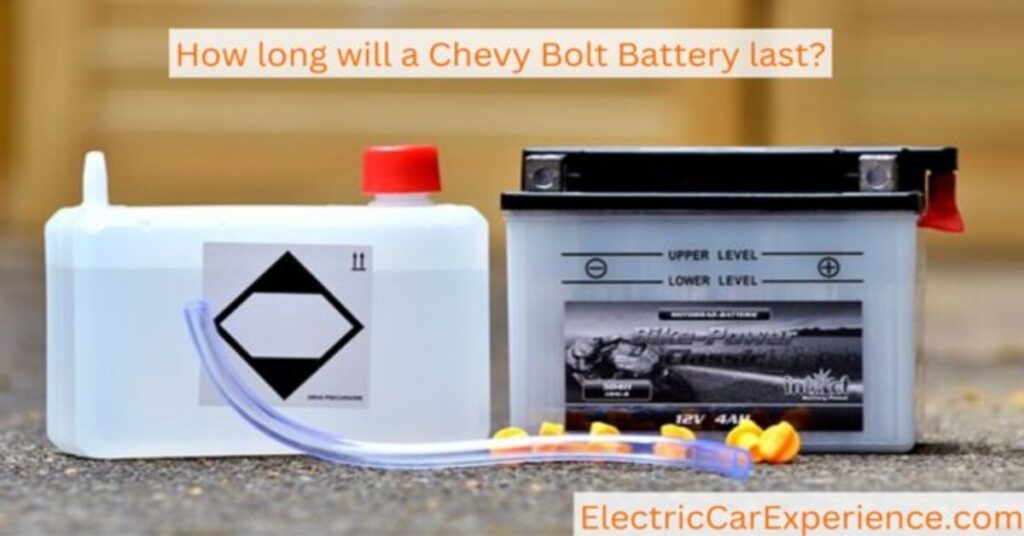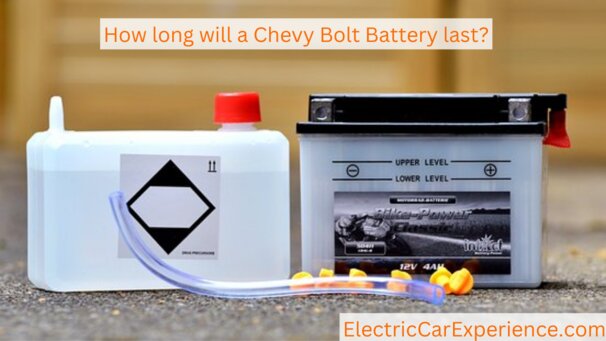
The Chevrolet Bolt is a compact E.V. hatchback introduced in 2017 and is the best-selling E.V. in the U.S. that is not a Tesla. It is one of the cheapest all-electric cars today, with terrific performance and an outstanding range. The Bolt underwent an exterior and interior redesign for 2022, and a slightly larger crossover variant, the Bolt EUV, was introduced. If you are considering purchasing a Bolt as your next car, you may be concerned about its durability and typical lifetime. So How Long Will A Chevy Bolt Battery Last
Before significant battery, degradation affects the Chevy Bolt’s range and performance, its lifespan is estimated to be between 300,000 and 400,000 miles. At a conservative 20–26 years of use, given an annual mileage of 15,000 miles with regular maintenance, accurate charging, and a cautious driver.
Methods for Assessing the Battery Lifespan of a Chevrolet Bolt
Eric Way of “Torque News,” concerned about the health of his Bolt’s battery after updating the BMS, decided to figure out how much it had degraded in the last 100k miles.
Way estimated that his Bolt EV had lost roughly 8% of its initial capacity at 70,000 miles before the upgrade. After visiting the dealership, he noticed a disparity in his data and wondered whether the 8% battery deterioration he detected after 70,000 miles was an exaggeration.
Thus, with the vehicle nearing 100,000 miles, he set out for the second time to measure the degradation. Beginning with a fully charged battery, Way traveled 200 kilometers before stopping for the first charge. He started by noting the energy consumption and the remaining battery percentage.

This information computed the expected capacity left by dividing the kWh consumed by the % utilized and multiplying by 100.
This method gives an accurate estimate of energy, in kWh, accessible in the battery, yet it still allows for error. The closer the battery is to fully empty, the more accurate the findings seem.
Finally, battery deterioration may be computed by comparing the current energy supply to the battery’s declared capacity (in this example, 60 kWh) and to any past capacities that have been calculated and recorded. The rate at which the battery degrades can be monitored by performing this test regularly, allowing for the construction of a reliable and precise energy pattern available over time.
Chevy Bolt Battery Degradation
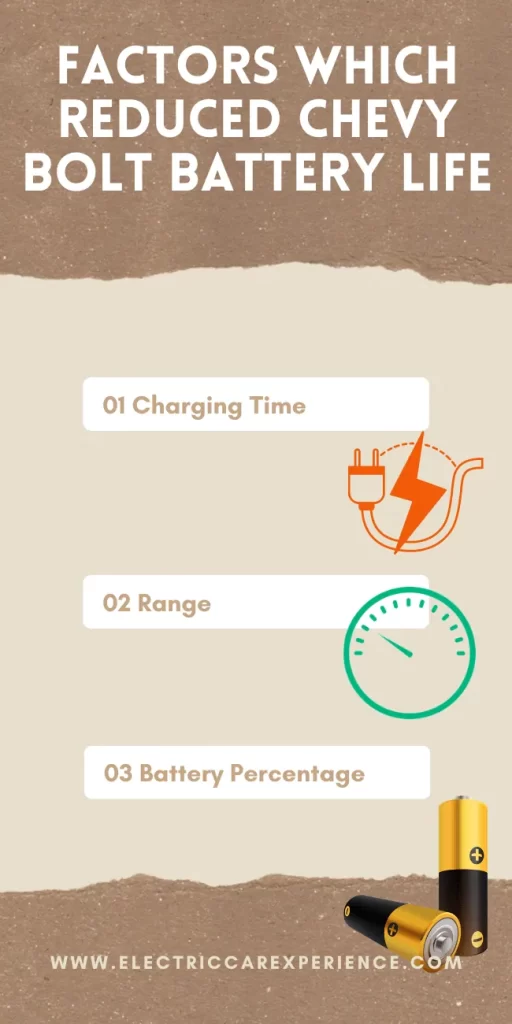
The battery life of a Chevy Bolt is estimated to be between 200-300,000 miles or 6-10 years. But Chevy gives an eight-year/100,000-mile guarantee covering any battery concerns until these milestones pass. Most modern electric cars provide this warranty coverage as standard.
How rapidly do the Chevrolet bolt’s batteries discharge? Used Bolts travel approximately 133 and 325 miles when the battery is completely charged. The Bolt’s battery has to work to go and get you where you’re going, so the distance it can go depends heavily on environmental factors. Your Bolt’s mileage and battery life may be affected by high temperatures or driving on steep inclines.
Although all-electric car batteries eventually deteriorate, the Bolts should survive for at least a decade if driven on generally level terrain and moderate temperatures (about 70 to 80 degrees Fahrenheit). If your Bolt’s range begins to decrease and you find yourself charging it more often, the battery may deteriorate. You may also notice slower acceleration and less powerful motor performance.
| Model Year | No. of Complaints Car Complaints | No. of Problems Car Problem Zoo |
| 2022 | NA | 11 |
| 2021 | 0 | 30 |
| 2020 | 2 | 44 |
| 2019 | 3 | 137 |
| 2018 | 3 | 57 |
| 2017 | 7 | 261 |
2024 Chevrolet Bolt Ev Battery Replacement Cost
When the E.V. battery’s warranty expires, how much does it cost to replace it? Although most E.V. batteries are expected to outlive the vehicle, several sensationalized accounts of high repair costs exist. Insights into the current and potential costs of replacing electric vehicle batteries are provided below.
How much does the battery for an electric vehicle typically cost? According to the Department of Energy, lithium-ion power packs for electric vehicles are $153 per kWh as of the beginning of 2023. That would translate to an estimated starting price of $15,300 for a brand new 100 kWh battery pack for a Model S.
Electric vehicle batteries are more expensive now than in 2021 when they cost just $138 per kWh. Supply chain challenges and materials shortages, as more manufacturers put their efforts into making EVs, are mostly to blame for today’s higher pricing, which is still a long cry from the $1,355 per kWh saw in 2008.
Industry executives still anticipate the price of batteries for electric vehicles will come back down close to $100 (and optimistically less than $100) per kWh in future years. At the same time, uncertainty in the materials market makes creating a schedule difficult.
The typical size of a battery pack for an electric vehicle is between 40 and 43 kWh globally but between 60 and 75 kWh in the United States. That puts the average cost to replace an E.V. battery in the U.S. between $9,180 and $11,475. The average cost to replace an electric battery will likely be based on Tesla’s pricing, which may differ from other brands with much higher production costs. Tesla continues to dominate the U.S. E.V. market.
The least expensive option for replacing the battery pack in an older Nissan Leaf would be $3.5k to $4.5k (24-30 kWh, refurbished). So far, the Long Range rechargeable battery for the F-150 Lightning is the most expensive electric vehicle battery we’ve seen, costing over $47,000 to replace (note that Ford did design the Lightning to ideally never require a complete replacement; we’ll get to that later). The 213 kWh pack on the 2024 GMC Hummer EV SUV, which has the largest battery pack currently available, will win the award for the most expensive new battery for an E.V.
| Year | Repair Costs | Maintenance Costs |
| 1 | $0 | $138 |
| 2 | $0 | $366 |
| 3 | $107 | $189 |
| 4 | $254 | $491 |
| 5 | $370 | $1452 |
When Should You Get A New Vehicle Battery?
Get a new battery as soon as possible if your automobile shows signs of a dying battery. If your car’s battery needs replacing, you may take it to your normal mechanic or look into a firm that does it in your area. If it’s more convenient, we have mobile mechanics who can visit you.
A low car battery may stop your automobile anytime and anywhere. The worst thing, though, is not even that. A bloated or leaking battery can cause an explosion that can ruin your car’s engine. If your car’s battery shows any indications of dying, you should get a new one as soon as possible.
Warnings That It’s Time To Get New Batteries For Your Vehicle
Some of the most obvious indicators that your car battery needs replacing are as follows:
- The car will not crank: A dead battery means you won’t be able to start your car.
- Vehicle starts slowly: Your automobile may be sluggish to start in winter. Yet, if the battery’s charge is low, starting the engine will be difficult.
- Indicators flash on the dashboard: The warning light will come on if your car has a battery issue.
- Mechanical and electrical failures: Dim headlights and reduced output from electrical devices are symptoms of a failing battery.
- Battery swelling: An overcharged alternator is usually to blame for a vehicle battery that has become too large.
- Battery acid leakage, indicated by a rotten egg smell, can corrode and damage other engine components.
- An aging battery: The average lifespan of a lead-acid battery is 3–5 years. There will come a moment when your battery has just run its course.
Electric Vehicle Replacement Battery Service Expenses
The time and money required to replace a battery will vary depending on where you live, the expertise of your local dealership or service facility, and the severity of your battery’s issues beyond what a “simple” battery swap can resolve. The battery replacement process is often quick, particularly when dealing with a swap-friendly E.V. like the Nissan Leaf. Most battery switches take less than 15 hours, with several coming in at only about 3 hours.
Labor costs for E.V. dealership repairs are almost 20 percent more than the national average, or $171.43 per hour. Some sources put the E.V. labor cost above $250 an hour in high-priced locations like California. Considering these numbers, the labor cost to replace the battery in your electric vehicle could be anywhere from $600 to $2,550.
Do You Offer a Partial E.V. Backup Battery Replacement Service?
Suppose just a few cells in an electric vehicle’s battery pack malfunction. In that case, service technicians should be able to identify the faulty ones using diagnostic software or visual examination. In principle, the problem might be fixed by swapping out only one of the batteries. In practice, however, most E.V. battery packs are built in a manner that makes changing simply one cell challenging (or impossible). The most efficient method would be to replace multiple cells at once or an entire pack section.
Sadly, many dealerships still need more specialized equipment to perform repairs on only a portion of an electric vehicle’s battery pack. A hot-button problem in the E.V. sector right now is that automakers are not necessarily giving up training to independent automobile mechanics to master their H.V. systems. The need for specialist E.V. diagnosis and repair is on the rise, yet dealerships that have access to E.V. training need to be faster to update their staff and facilities.
The repair versus replacement dilemma is that replacing an E.V. battery pack rather than fixing it is often quicker. Hence, although some electric cars (like the Ford F-150 Lightning) allow merely the battery pack to be replaced in the event of a malfunction, for many E.V. manufacturers, this is the sole choice.
When Should You Get A New Vehicle Battery?
DIY battery replacement is a simple task. The replacement of a vehicle battery by an expert is the simpler alternative if you are not acquainted with auto components. Nonetheless, here is a basic rule of thumb for swapping out a vehicle battery:
Find The Dead Battery By Opening The Bonnet
Unplug the battery wire from the terminals. First, disconnect the negative cable from the dead battery’s negative terminal, and then disconnect the positive cable first from the live battery’s live terminal.
Take out the old battery then clean the terminals and battery tray to get rid of any rust. The tray is where you will put the new car battery.
After separating the positive and negative cables, reconnect the beneficial cable to the positive-negative end first.
Please secure the hood and turn the engine on. The fresh battery should go in immediately.
Chevy Bolt 2023 Battery Life
The Chevy Bolt is an “orphan car” in the auto industry, as the company has announced plans to phase out production of the compact hatchback in favor of newer electric vehicles powered by G.M.’s next-generation Ultium battery. Unfortunately, the Bolt is less expensive than the Hyundai Ioniq 5 and the Kia EV6. However, the Chevrolet Bolt’s biggest selling point is the $6,000 price drop between the 2022 and 2023 models we tested. The only real drawbacks to consider are the lack of all-wheel drive and the fact that future G.M. E.V.s will almost certainly feature improvements.
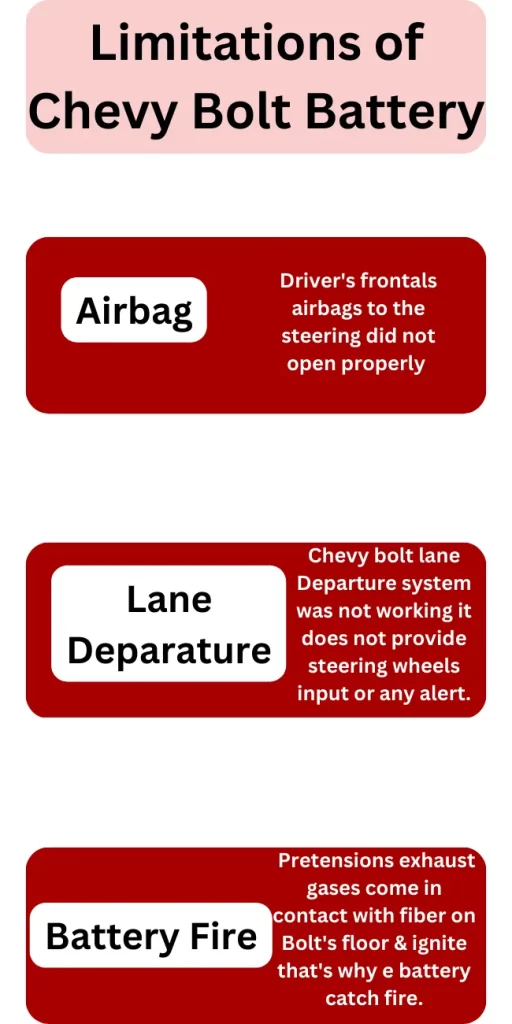
How Long Is the Battery On A 2023 Chevrolet Bolt? Depending on the climate, battery size, battery type, and driving habits, the battery lifespan in your 2023 Chevrolet Bolt EV might be anywhere from three to five years.
| Charger Type | Range per Hour of Charge (miles) | 0 to 100% Charge |
| Level 1/120V | 4 | 2 to 3 days |
| Level 2/240V | 25 | 9 to 10 hours |
Electric Vehicle Propulsion System
Every Bolt EUV has the same 200-horsepower electric motor and the front drive. You can’t have all-wheel drive. Due to electric motors’ instant power delivery characteristics, acceleration ought to be brisk. The Bolt EUV can be driven with a single pedal thanks to regenerative braking, which also helps to increase the vehicle’s range. The Bolt EUV’s electric powertrain provides peppy acceleration. Although it isn’t the fastest electric SUV on the market, it reached 60 mph in 6.8 seconds on our test track. The ride is comfortable, even over bumps on the road, and the handling is adequate.
Power, Capacity, and Operating Time
The EPA says the 247-mile range that comes standard on all Bolt EUVs’ 65.0-kWh battery packs is more than enough. On our 75-mph highway test, the 2022 Bolt EUV achieved 190 miles of range. That’s on par with what you’d get from competing electric SUVs, albeit the Tesla Model Y has a bigger battery and can go an estimated 326 miles between charges.
While the Bolt EUV can indeed be charged from a regular 120-volt outlet, those interested in faster charging times at home should consider investing in a 240-volt connection. D.C. rapid charging is supported on this SUV, and according to Chevrolet can add up to 95 miles of driving distance in only 30 minutes.
Three Words: Cabin, Luxury, And Storage
The Bolt EUV’s interior looks modern and well-finished. All versions come equipped with a flat-bottom steering wheel as well as a push-button gear selector, while the seat fabric has a sly geometric design. Legroom for rear passengers in the Bolt EUV increases by more than three inches thanks to the vehicle’s increased length, width, and height compared to the standard Bolt hatchback. While longer overall, the EUV’s cargo area is only somewhat larger; still, most drivers should be able to fit their suitcases, grocery bags, and other items.
Chevy Bolt Battery Warranty
If your electric vehicle’s battery fails to function as expected, the auto warranty will pay to replace it. Manufacturers often provide this guarantee for a certain time or number of miles. For instance, the Model S electric car battery is covered under warranty for 8 years or 150,000 miles.
What kind of guarantee does a Chevrolet Bolt come with? During the warranty period of 3 years or 36,000 miles, we will fix any manufacturing or installation flaws in your vehicle at no cost to you, as long as the problem is not due to normal wear and tear.
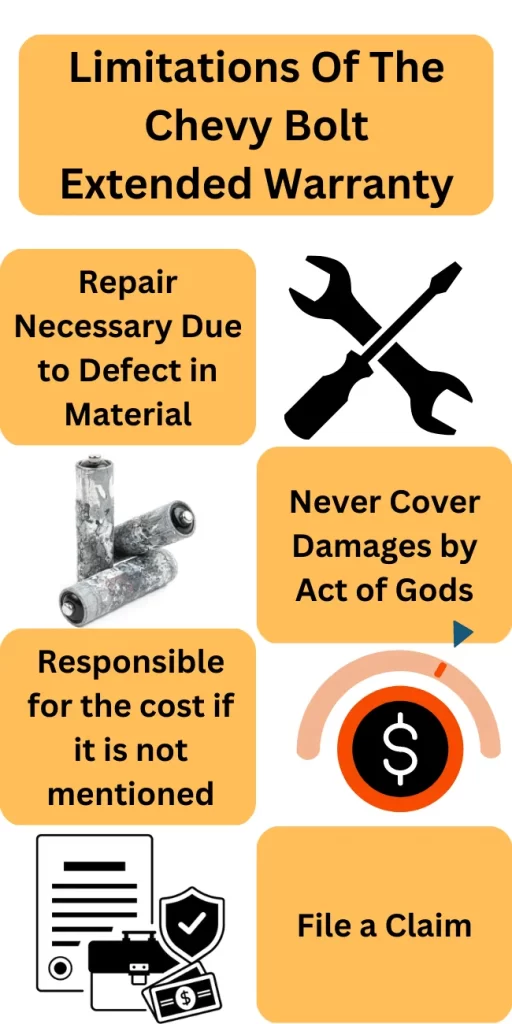
Electric vehicle battery warranties are the only coverage manufacturers offer to mitigate the financial impact of a malfunctioning component. For example, new E.V.s have comprehensive bumper-to-bumper protection that covers practically all car parts. Powertrain warranties, corrosion warranties, and emergency roadside assistance are all standard on E.V.s.
The electric vehicle battery warranty is in addition to any other applicable warranties. Instead, a standalone policy protects just the electric vehicle’s battery. The Nissan Leaf E.V., for instance, comes with a three-year/36,000-mile bumper-to-bumper warranty and a five-year/60,000-mile powertrain warranty. Its electric vehicle battery guarantee, which lasts for eight years or 100,000 miles, is independent of this protection.
Extending The Battery Life Of Your Electric Vehicle
A guarantee covering damage to the electric vehicle’s battery is a huge relief. Nonetheless, many motorists would prefer to extend the life of their batteries than replace them. So, how can you prolong the battery life in your electric vehicle? Here are a few pointers:
- Update Your Car’s Software Frequently
The battery in your E.V. is a piece of connected technology that can be kept up to date with software revisions. Always implement newly released patches as soon as possible. Doing so will extend the battery’s useful life. Keeping to the guidelines of the E.V. battery warranty is another benefit. Without frequent updates, coverage under such guarantees may be void.
- Instead Of Utilizing Public Level 3 Chargers, Charge At Home
Level 3 charging, commonly known as D.C. fast charging, is the fastest charging option and is ideal for long car rides. Nevertheless, a Level 1 or Level 2 charger at home is preferable for regular usage. Manufacturers advise against Level 3 charging too often, which might cause the battery to overheat and eventually lose capacity.
- Keep the Voltage Around Midway
Keep the battery charge between 20% and 90% for optimal health throughout everyday usage. Electric vehicle manufacturers like Ford advocate adhering to such standards. The battery might be damaged if the charge drops below 20%, and charging it to 100% isn’t ideal. Nevertheless, although a full charge is great for a road trip, it is not recommended for daily use.
- Consult The Manual Provided
Most of us have plenty of experience maintaining gas-powered vehicles from our years behind the wheel. Electric cars, however, function differently than conventional automobiles. If you’re still getting used to caring for E.V.s this Way, you’ll need to become comfortable with these distinctions. So, you should study the instructions that came with your E.V. You’ll find a lot of knowledge on maintaining your E.V. and its battery in the handbook.
Tesla’s Battery Warranty and Expected Service Life
Look at the most popular EVs in the U.S. and see how they fare regarding battery life claims, warranty coverage, and potential out-of-pocket replacement costs. This data might help you determine whether you should budget for expensive battery replacement costs down the line, should you decide to purchase an E.V.
Kelly Blue Book predicts that by the first quarter of 2022, Tesla will have captured almost 75 percent of the U.S. electric vehicle market (Opens in a new window). A Model Y electric vehicle (E.V.) outsold all others during that time. Both the Tesla Model X and the Model S were among the top 10 vehicles. In its 2021 Impact Report, the business estimated that vehicles are abandoned after around 200,000 miles of use in the United States and about 150,000 miles in Europe (Opens in a new window).
Reports have surfaced of Tesla cars achieving much higher mileage (Opens in a new window). According to Tesla, the Model S and Model X lose approximately 10% of their battery capacity after 200,000 miles of use.
For eight years or 100,000 to 150,000 miles, depending on the Model, all new Tesla vehicles come with a restricted warranty(Opens in a new window) covering the repair or replacement of a faulty lithium-ion battery or drive unit. Tesla promises a minimum 70% battery capacity retention for all models throughout the duration of the warranty. The remaining warranty coverage on a pre-owned Tesla will be transferred to the new owner.
The electric car manufacturer’s warranty will pay for repairs to the vehicle caused by a battery fire, regardless of who started it. Nevertheless, it does not cover wear and tear, deliberate damage, floods, or natural deterioration of the battery or motor unit.
You have a legitimate claim if, while your Tesla is still under warranty, its battery capacity drops to less than 70% of its original range. If the battery can’t be fixed, Tesla will replace it with a brand-new, refurbished, or remanufactured one.
When replacing a battery under warranty, Tesla promises that “the energy capacity of the replacement battery is at least equivalent to that of the original battery before the failure occurred.” Nevertheless, the company cannot guarantee that the vehicle will be returned to “like new” condition.
What to Do When Your Tesla Battery Is Out of Warranty
Replacing a Tesla battery after the expired warranty is rather expensive. We need to talk about the many thousand dollars needed to purchase a new hybrid battery for a Prius. The costs of replacing a Tesla battery outside of the warranty period may easily exceed $20,000.
A Tesla owner in Finland blew up their 2013 Model S(Opens in a new window) last year after being charged $22,600 to replace the battery. In a separate incident, YouTuber Tyler Hoover of Hoovies Garage was recently quoted $22,500 by a Tesla repair shop to replace the battery in a 2013 Model S P85. Instead of replacing the battery, Hoover took the car to a repair shop, where the technicians could get it going again for around $5,000.
Thirdly, only recently, a Tesla Model 3 owner was charged $16,550 for non-warranty repairs and maintenance, including the replacement of the battery pack. Tesla charged the customer $13,500 to replace the defective battery with a refurbished one. Such incidents, although unfortunate, are uncommon and shouldn’t dissuade you from buying a new Tesla if you’re interested in one. Due to the exorbitant price of maintenance, owning or purchasing a used Tesla with 100,000 miles or more on the odometer is a significantly riskier choice.
The truth is that electric vehicle batteries have a finite lifespan, at least for the time being. If your Tesla’s battery ever fails, the firm recommends replacing it at one of their service locations. Every used battery pack is recycled to the “best effort” of Tesla so that raw materials may be extracted and new batteries can be manufactured. Battery warranties from competitors to Tesla are competitive with or even better than Teslas. Unsurprisingly, federal law mandates a warranty period of eight years or 100,000 miles for electric vehicle batteries.
KBB reports that in Q1 2022, behind the Tesla Model Y and Model 3, the Ford Mustang Mach-E had been the third best-selling E.V. in the United States. The Audi e-Tron came in at number one, followed by the Nissan Leaf, the Kia Niro, the Hyundai Ioniq 5, and the Kia EV6 (No.10).
The battery in the Ford Mustang Mach-E, Nissan Leaf, or Audi e-Tron is covered by a standard guarantee of 8 years or 100,000 miles. Nevertheless, Hyundai and Kia extend their E.V. batteries’ warranties by an additional 10 years or 100,000 miles. The batteries in all-electric vehicles will degrade over time, although experts agree that most models have a lifespan of 10–20 years before they need to be replaced. That’s a big number, but when you consider that the typical American keeps their new vehicle for 8.4 years, you can rest certain that the battery in your brand-new E.V. will never need to be replaced. And if yours does, you may be certain that it is warranted.
To Learn More About Electric Vehicles, Please Read On
The more you learn about E.V.s, the more questions you’ll have, and so on. The 10,000 miles we drove in search of the finest mobile network across the nation provided us with a rare opportunity to pit electric, petrol, and hybrid vehicles against one another in a head-to-head fuel economy comparison.
Check out our charging primer if you’re new to electric vehicles. The page discusses the charging ports now available for E.V.s, how to make the most of those ports using an adapter, and how to determine in advance whether or not a certain charging station is compatible with your vehicle.
Even if France doesn’t have a cemetery for E.V.s, you may still read our article on their genuine hidden environmental costs to see whether they’re as green as we claim.
Chevy Bolt Battery Replacement
While considering the purchase of an E.V. or plug-in hybrid, many consumers worry about how often the battery will need to be replaced.
Then what will it cost to start replacing that battery? It is good knowledge that batteries deteriorate over time due to a process known as “calendar aging.” Calendar aging, like human aging, is a steady decline from a starting point. Use and environmental factors also contribute to the gradual decline in battery life. The deterioration of batteries was the subject of a lengthy essay we authored.
The Cost Of A New Battery For An Electric Vehicle
Depending on the pack, size, and manufacturer, replacing an E.V. battery might cost anywhere from $5,000 to $20,000. You are entitled to a free battery replacement from the manufacturer throughout the specified warranty period (usually 8 years or 100,000 miles).
But what if the warranty has expired? Current pricing information might be hard to come by since battery repairs are still uncommon. Just 1.5% of our community’s 15,000 EV drivers have had a battery failure. It is important to remember that numerous manufacturer recalls led to significantly increased rates of battery replacement for the Chevrolet Bolt and the Hyundai Kona EV.
The price you would pay now for batteries is different from the price you would pay next year or in five years as a battery, costs continue to drop. In 2019, the Mack Institute for Process Innovation at the Wharton School of Business combined information from academic institutions, news outlets, search engines, industry experts, and manufacturer statements.
Between 2007 and 2019, the price of battery packs dropped by 16 percent. In 2019, the authors predicted that the average price of battery packs would be $161/kWh. According to that calculation, in 2019 a 100 kWh battery, such as those found in Tesla’s long-range vehicles, would set you back at least $16,100 (not including installation, taxes, etc.). The replacement cost for a 100 kWh battery in 2019 dollars would be $5,600 if the current rate of decline in battery prices continues until 2025.
However, in 2021–2022, the general market trend in the price of lithium slowed, and the price of battery components started to grow a little. Nevertheless, prices have begun to decline again as of March 2023, down by roughly 20% since the start of the year. Replacement lithium-ion battery costs will remain steady for at least another year due to strong consumer demand for used batteries.
As Compared To Other Battery Price Aggregators, How Does This Service Fare?
The predicted cost by 2025 is $120/kWh to $135/kWh, according to research published in April 2019 by the International Council on Clean Transportation (ICCT). This is more conservative than the Wharton study, which estimated that by 2025, replacing a 100 kWh battery will cost up to $15,000. The ICCT study acknowledges that predictions of battery prices have regularly fallen short of the mark compared to actual price reductions. They qualify this with the possibility that prices at the battery pack level will be $89/kWh by 2025 and $56/kWh by 2030 if a more optimistic study is undertaken.
The average price of battery capacity is expected to reach close to $100/kWh by 2023, seven years earlier than Bloomberg NEF models projected in 2016. This is according to the most recent Bloomberg New Energy Finance (BNEF) projection. The ICCT 2019 study cites the BNEF models’ prediction that battery pack level prices would average $62/kWh by 2030. By 2030, the estimated cost to replace a 100 kWh pack might rise to over $6,200.
According to McKinsey’s analysis from 2016, the average cost of a battery pack was around $227/kWh, with future predictions predicting that this cost will drop to below $190/kWh for electric vehicles. The 2020 Bloomberg NEF report shows these projections were well off the mark.
Cost to Replace Batteries in a Chevrolet Bolt
All Chevrolet Bolt batteries are recalled and replaced due to a potential manufacturing problem. That can give you an idea of when the battery life of your Chevrolet Bolt from before the recall was no longer adequate. You may see some pre-recall prices for Chevrolet battery replacements down below.
A Chevrolet Bolt owner posted on chevybolt.org in November 2018 that a dealership had quoted him $16,250 to repair the battery, plus another $870 in labor costs. Given the 60 kWh capacities of the Bolt’s batteries, this works out to about $271 per kilowatt-hour or about 68% more than the 2019 average.

- Keeping an Eye on Dead Batteries
It should not be a surprise that treating your battery gently will increase its life and postpone replacement. How to properly care for your battery is covered here.
- Do not Let Your Battery Go Too High Or Low
It would help if you only used D.C. rapid charging in extreme cases. Rather than a single big payment once a month, several smaller ones would be preferable.
Let the battery reach room temperature before charging. After your car is connected, it will do this for you automatically. Keep your battery cool by parking in the shade during the warmer months.
Preheating your vehicle while it is plugged in or utilizing seat warmers are two ways to reduce the amount of power used by the air conditioner and heater.
- To Extend Your Range, Accelerate Slowly
Do not go racing down the motorway. Examine the battery care instructions in the handbook. Make a seasonal upgrade by switching to more fuel-efficient tires.
Do you own an electric vehicle? Get free, customized reports on the status of your E.V. by joining the Recurrent E.V. community. In addition to joining a rapidly expanding community of E.V. drivers dedicated to spreading the word about the benefits of E.V.s, you will get reports that provide valuable insights into how your E.V. is doing.
Chevy Bolt Battery Lifespan
Electric vehicles are better for the environment and can go hundreds of miles on a single battery charge. So how long do batteries typically last in electric vehicles? Good news! Owing to recent developments, electric vehicle battery life expectancy is presently predicted from 10 to 20 years!
In addition, the batteries in most modern E.V.s are covered by a lengthy warranty offered by the manufacturer. Read on for additional information from Terry Labonte Chevrolet in Greensboro regarding E.V. battery life, and give us a call when you are ready to take the wheel of an electric vehicle.
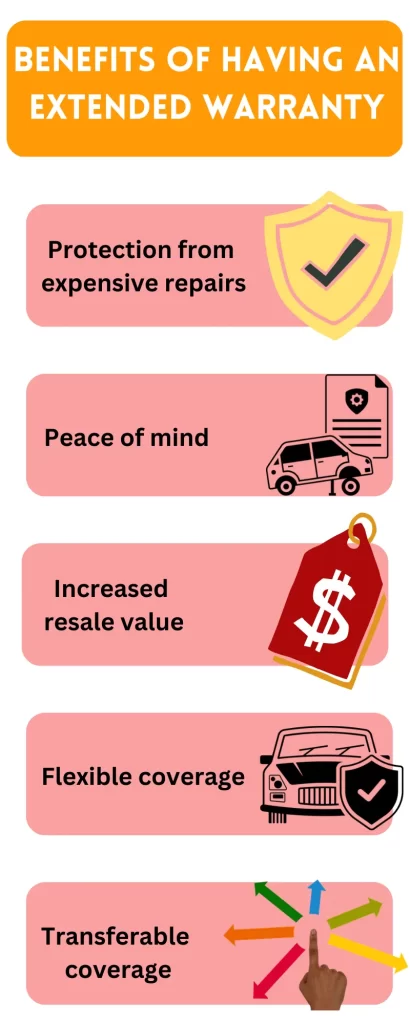
How long will the batteries in electric vehicles last? You can count on getting at least 8 years or 100,000 miles out of a brand-new battery in your Chevrolet Bolt EV or Bolt EUV. Read on to find out how long the batteries in Sunset Chevrolet’s EVs last.
Electric vehicles (E.V.s) have fewer environmental impacts and lower maintenance costs than gasoline-powered ones. Even still, some High Point motorists are wary of E.V.s due to worries about battery longevity since E.V. batteries are among the costliest vehicle components, often costing between $5,000 and $15,000.
Yet, the price of an electric vehicle battery has reduced dramatically in recent years, and the trend should continue. The majority of electric vehicle battery warranties offered by automakers are for eight to 10 years. Your battery will be replaced with a brand-new one at a discounted price if it dies within the warranty period.
How Do Electric Vehicle Batteries Fail?
Temperature, cycles, and time are the usual culprits in the deterioration of E.V. batteries. The duration of an electric vehicle battery is greatly influenced by its storage and operating temperatures, and in general, E.V. batteries have a shorter lifespan in warmer areas.
Battery management systems (BMS) in E.V.s are more complicated than lithium-ion batteries in smartphones and laptops, and they control charging and discharging to increase battery life. This implies the two main causes of E.V. battery deterioration are time and temperature.
How Long Would an Electric Car Battery Last?
Nonetheless, the issue of how long an E.V. battery will endure persists. Thankfully for buyers, federal law requires E.V. manufacturers to provide an 8-year/100,000-mile battery guarantee, while California provides a 10-year/150,000-mile warranty.
As the cost of producing E.V. battery packs decreases, firms can develop batteries with a greater energy potential, hence increasing the mileage that can be achieved by these vehicles. Batteries degrade less quickly thanks to the new technology, so their maximum potential remains relatively constant. Even when they wear down, modern batteries will continue to provide more driving time than their predecessors did when they were brand new. Finally yet importantly, unlike standard batteries, lithium-ion batteries may be replaced in parts rather than in whole as they fail. Substituting new cells for old ones is a cost-effective alternative.
- Useful Advice for Extending the Life of Electric Vehicle Batteries
The battery in your electric vehicle is the equivalent of the petrol tank in a conventional car. It’s crucial to learn how to maintain your electric vehicle’s battery in peak condition before making the move. If you follow these guidelines, you can get more use out of your battery.
- Pay Attention to Your Billing Practices
It may come as a surprise, but fully charging your electric car is bad for its durability. Your E.V. may include settings for “Regular” or “Max” charging, the two most common modes. Unless you charge your automobile for a short duration, the greatest thing you can do for your batteries is charge it at “Standard” night or for a few hours. You would want the battery to be 100% for a short period.
- Maintaining A Voltage Below 20%
Discharging your battery to zero every time you charge it is also not a good idea.
To keep your electric car’s battery in peak condition, it is recommended that you avoid discharging it below 20% and instead use it between 20% and 30% of its rated capacity regularly.
Make it a routine, like plugging in your computer or phone to charge occasionally. This practice is now quite convenient because to smart charging methods and built-in battery management systems (BMS).
- Do Not Rapidly Charge
While quick and ultra-rapid charging is gaining popularity as part of the electric car infrastructure, they are not practical for regular usage.
Choose between slow or quick charging daily, depending on your needs. However, we seldom travel more than a few miles at a time on islands, so there is no pressing need for such very rapid charging.
Only a few hours of charging at home, slowly or quickly, can provide enough energy to travel about and satisfy your daily driving demands.
Be careful to plan so that your electric vehicle has enough charge to bring you home if you intend on parking it in a garage while you travel. Leave your electric vehicle unplugged or configure your battery to prevent further charging if you won’t use it to arrive home. You can recharge it when you go back inside your own house.
- Look for a Cool Spot
Always look for a shady spot to park your vehicle, whether you’re going shopping, working, or just going out for a few drinks. Park in the shade to extend the life of the vehicle’s internal electronics and batteries. This will keep the car cool when you come back and prevent the electronics from overheating.
Conclusion
The Chevrolet Bolt has been on the market for a while, and reviews consistently praise its dependability. The Bolt’s improved dependability may be attributed to its electric motor and other components being mechanically simpler than those of a conventional internal combustion engine (ICE) car.
G.M.’s decades of expertise in the auto industry have helped improve Bolt’s build quality. Most Chevrolet Bolt owners on different online forums have had a positive experience with their vehicles after many years of ownership.
Yet, this does not mean that the Bolt is without flaws; mechanical issues are to be expected, as they are with every vehicle. The main documented problem the Bolt has experienced is extremely serious; defective batteries have led to fires or increased fire danger; Chevrolet has now recalled all model year 2017-2022 Bolt and Bolt EUV cars to repair its battery modules. G.M. has temporarily halted manufacturing because of this, which will likely cost the company about $1 billion.
FAQs
How Long Will the 2023 Chevy Bolt Battery Last?
Depending on the climate, battery size, battery type, and driving habits, the battery lifespan in your 2023 Chevrolet Bolt EV might be anywhere from three to five years.
How Much Does It Cost To Replace A Chevrolet Bolt Battery?
The price, including work, ranges from $17,000 to $19,000 for the 60 kWh battery used in the Chevy Bolt. The current Nissan Leaf’s battery is less powerful than the Bolt’s, but it’s also around $16,000 less expensive.
How Many Miles Will A Bolt EV Last?
The Bolt’s EPA-estimated all-electric range for the 2020 model year is 259 miles (417 km), up from 238 miles (383 km) for the 2017-2019 model years, and its EPA-estimated fuel efficiency rating for combined city/highway driving is 119 mpg (18.0 kWh/100 km).
How Far Can A Chevy Bolt Travel On A Full Charge?
The Chevy Bolt is the first mass-market electric vehicle to have a range of more than 200 miles on a single charge, making it a fantastic choice.
Posts Related to Electric Cars and Batteries
- Tire Pressure Monitoring System Fault In Tesla Model 3-A Complete Guide
- Energy Saving Mode Tesla-A Complete guide 2024
- Tesla Model S Low Voltage Battery Replacement Cost
- Tesla Low Voltage Battery Location
- Tesla Model 3 SR Range
- Can Electric Car Batteries Explode?
- Tesla Model 3 Battery Fuse
- Spare Battery For Electric Car
- Tesla Model x Low Voltage Battery Replacement
- How Much Battery Does Sentry Mode Use Per Hour?

